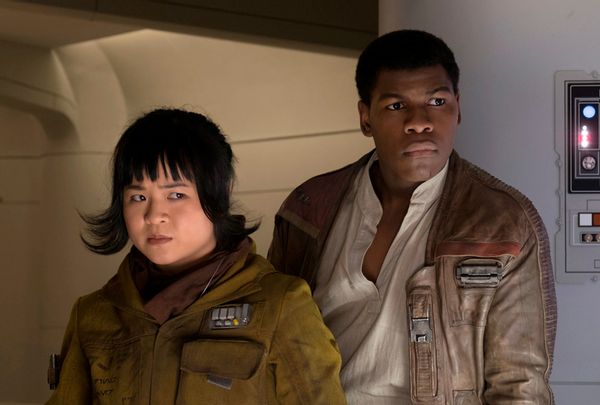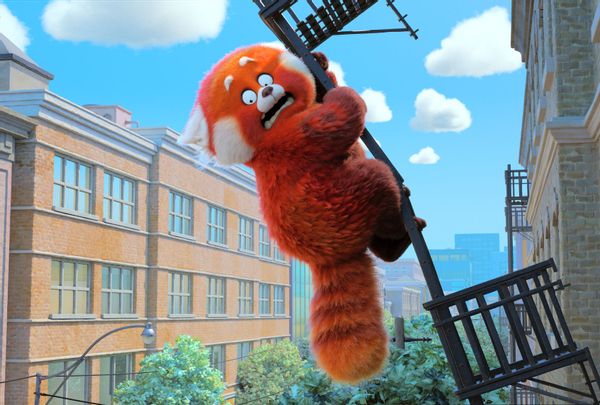
One of the first highly public instances of "Ms. Marvel" trolling happened nearly a decade ago, courtesy of Stephen Colbert. "Ladies and gentlemen, America has lost another battle in the culture war, which is surprising because we've got all the guns," he says. "This time the battlefield is comic books. And folks, that saddens me because I'm a fan."
Colbert was referring to Marvel's announcement in November 2013 that Kamala Khan, a Muslim teenager from Jersey City, was set to assume the Ms. Marvel mantle.
"This affront has taken me aback. A Muslim cannot be a superhero, for Pete's sake! They're on the no-fly list," Colbert imperiously huffs. ". . . It's even more upsetting when you consider the original Ms. Marvel. She was wholesome and all-American! Blonde! Family values! With two bulging chest muscles and clearly wearing her Sunday church panties! This is nothing more than Sharia creep, plain and simple."
Since this rant was brought to us by "The Colbert Report," Colbert's hallowed satire of right-wing talk shows in which he parodied Bill O'Reilly and other Fox News windbags, the audience understood it to be a bit.
Nearly a decade later another group of self-important white guys are railing against Kamala Khan's right to exist in the Marvel Universe. The difference is they're not joking, even if some of them insist that they are.
RELATED: "Ms. Marvel" and the dawn of the strict TV supermom
The actors are as varied as their motivations, you see. Some engage in review bombing, as they did to Disney+'s "Ms. Marvel" hours after its debut, because it's an easy way to kick what they see as the social justice warrior hornet's nest. Others camp out on in Facebook groups that have been recycled to manufacture the illusion of inflated offense for their own entertainment.
Each is a cancer cell in a larger amorphous hate blob descended from Gamergate.
"Obi-Wan Kenobi" star Moses Ingram was their most recent target, and her harassment and Disney's response, including a video post from Ewan McGregor that defended her, was widely reported. Not long before Ingram made her "Obi-Wan" debut as Inquisitor Reva Sevander, bigots piled on to newcomer Leah Jeffries when Disney announced she'd been cast as the new Annabeth Chase in the upcoming Disney+ adaptation of "Percy Jackson and the Olympians."
All of this is either directly or tangentially a decentralized web referred to as The Fandom Menace, a group of extremely online comic book and "Star Wars" zealots that coalesced around a shared dislike for Rian Johnson's Lucasfilm sequel "Star Wars Episode VIII: The Last Jedi."

Regardless of how they identify, each is a cancer cell in a larger amorphous hate blob descended from Gamergate and Comicsgate, infecting the fandoms of the most ubiquitous entertainment franchises in the world – mainly Marvel, Star Wars and other Disney titles.
It's also leaderless and therefore easily deniable, allowing it to proliferate in spaces designed to be escapist and unserious. Because of this, most journalist coverage of fantasy- or comic book-related TV and movies caters to consumers engaging with these shows and films in good faith, in the form of episodic analysis or the specific artistry informing its visuals and scripts.
This may be the reason that our coverage and condemnation of these hate eruptions has taken on a reflexive pattern, too. I've certainly been guilty of this in this publication and elsewhere: We report on the offense, quote the reactions of person being targeted and amplify the voices rallying to support them. We boost the notion that malignant actors within fandoms are limited to a small group that excels at being louder than the reasonable majority.
We trust that by exposing each incident is enough, that the hatred toward the latest targeted actor will fade, which it usually does. We close the loop by expecting there to be another incident, and already knowing the reason, guaranteeing the cycle will begin anew.
It's easier to brace for impact, enact communications triage and wait for the problem to go away than to examine what's motivating the people behind these hate campaigns.
And there are answers to that question beyond the simplest, which is good old-fashioned racism. Don't get me wrong – that's enough of a reason for someone to devote a few minutes of time and mouse clicks to do their part in tanking the ratings on a show they view as a progressive agitprop.
The attacks on Ingram and Jeffries before her, and the campaign devoted to downplaying their severity in the wake of them, requires us to at least begin to grapple with where these campaigns begin and how each, in their own way, may contribute to the larger political efforts to mainstream white supremacy and radicalize the disaffected.
Geekdom went mainstream decades ago, but it's still commonly viewed through a filter of adolescent harmlessness. This is useful for the purposes of Facebook groups such as Christians Against Ms. Marvel, a private forum whose purported founder, a character calling themselves Wade Wilson – a troll in itself – describes its purpose as follows:
Ms Marvel might be the biggest slap in the face for conservative Christians to date!!! Disney has decided that the face of this franchise should not be Carol Danvers but should instead be a gay Muslim. no more straight Christian characters from Marvel. those days are over. please join us as we let Disney know that we will not BE CANCELLED!!!
That's . . . a point of view. Plausible, too, considering the right-wing Christian conservative protests over Disney's inclusive policies. However, tempting as it may be to correct factual errors in the page's so-called mission statement (Kamala Khan is neither gay nor replacing Carol Danvers) examining details about the page itself is much more informative.
Laughing off [Facebook] pages . . . is simple. Review bombing, less so.
The group's history reveals that it's only been called "Christians Against Ms. Marvel" since June 7, the day before the series debuted. Before that it was "Christians Against Doctor Strange in the Multiverse of Madness." Before that, it was called "Christians Against Turning Red."

But it's also quite clearly someone's idea of a long-running joke. The page claims 18,000 attention-seeking goblins, likely seeing a place to blow off steam by triggering the libs, strictly for the lolz. It's only "Wade Wilson's" second most popular page, though, coming in behind the 39,000 member strong "Linda Skeens Secret Cookbook" which merely 24 hours ago went by "Helen Keller Never Existed."
Laughing off pages like this one is simple. Review bombing, less so.
This is another a recurring strategy on database-driven movie and TV sites that posting aggregate scores of user ratings. The tactic's goal is to create the illusion that a show or TV series is a creative bomb by intentionally depressing their audience ratings with a barrage of one-star reviews or their equivalent. These ratings are easy to game on sites lacking specific measures to curb abuses, which is what Rotten Tomatoes did in 2019 following a coordinated bombing of its audience rating for "Captain Marvel."
IMDb star ratings remain stunningly simple to manipulate it seems. On June 9 "Ms. Marvel" was polling at a 6.6. out of 10, thanks to 22.2% of the site's reviewers giving the series one star. This dragged down the 39.5% giving it 10 stars, a fair share of which was probably contributed by users attempting to restore balance to the scale.
It didn't work in the long run. Today "Ms. Marvel" has a 6.1 user review rating, with the percentage of one-star votes having risen to 27.2. A person can simply claim that a lot of people don't like the series, but if that were so the RT audience ratings would resemble IMDb's. It doesn't, and by a significant margin.
On the surface these two examples likely rate as annoying ploys to gain attention or take swipes at a giant media conglomerate that ultimately doesn't factor juvenile backlash into its decision-making process. But they also serve as a distraction from the more dangerous problem posed by a handful of YouTube influencers such as Geeks + Gamers or TheQuartering, whose bread and butter is anti-"Star Wars" and anti-Marvel videos.

An exhaustive, extensively researched 2021 Medium post authored by Rewriting Ripley draws a connection between "Star Wars"' toxic fandom and these YouTube personalities and the right-wing ecosphere that came before them, and continues to nourish them. Everyone should read it to gain a greater understanding of how these figures profit off racism and misogyny in ways that aren't obvious prima facie, but are not well-hidden either.
Geeks + Gamers and TheQuartering, the YouTube vlogger moniker for Jeremy Hambly, style themselves as pop culture gatekeepers. Individuals associated Geeks + Gamers, including its founder Jeremy Griggs and contributor Ryan Kinel, also leveraging their brands as gateways to alt-right ideology via their personal YouTube channels.
Griggs, for example, has more than 101,000 subscribers to his channel operating under the handle DDayCobra, where he posts video with titles such as "Freedom Truckers Are Making Canada Great Again" and, in one video on posted on January 6, 2021, explains the rioting mob as the result of "we, the people" being "fed up" while decrying the violence. A second video posted the same day floats the conspiracy theory blaming the violence on the antifa boogeyman and Black Lives Matter activists.
That video is titled "The Media Is The Enemy Of The People," a favorite phrase of the 45th president that has a history of being invoked by Joseph Stalin, as well as the Nazis in Germany after the first World War. And if you know how YouTube's algorithms work, you can guess which videos begin surfacing alongside these.
Of course, each of these men is sophisticated enough in their approach to prevent running afoul of YouTube community guidelines. Instead of using slurs, they invoke terms like "woke" and rail against "SJWs" ruining the "Star Wars" universe.
None of them make specific calls for harassment or violence against the targets of their harangues which, when there isn't a woman of color to go after or Amber Heard isn't in the news, tends to be Lucasfilm president (and this group's Darth) Kathleen Kennedy.
Importantly, they and others go out of their way to insist that none of their vitriol comes from a racist place and condemn violence. But such disclaimers tend to be adjacent to gaslighting or misinformation diatribes. A popular recent one cast doubt on Ingram's reports about the nature of her harassment and Disney's assertion that racism exists among the "Star Wars" fandom.
If that's so, one popular argument goes, why didn't we hear of any racist backlash over Ming-Na Wen's casting in "The Mandalorian" and "The Book of Boba Fett" or Rosario Dawson taking on the role of Ahsoka Tano? This obviously ignores the salient fact that Wen and Dawson probably have longer careers and more managerial layers between them and their online fans and haters, whereas Ingram, Jeffries and others appear to run their own social media accounts, making it easier for trolls to see the tangible impact of their attacks.
For example, enough trolls bombarded TikTok's admins with enough fake violation reports to get both of Jeffries' accounts de-platformed in the wake of her "Percy Jackson" casting.
Want a daily wrap-up of all the news and commentary Salon has to offer? Subscribe to our morning newsletter, Crash Course.
Another reframes the statement the official "Star Wars" Twitter account posted in support of Ingram that reads, "If anyone intends to make her feel in any way unwelcome, we have only one thing to say: we resist," as being directed at anyone who doesn't like the series.
Griping about wokeness ruining "Star Wars" and the MCU is big business, and in case you haven't been paying attention ... business is good.
"We know Reva got a lot of backlash for her acting, for her spot in the story, for her importance, for everything she knew, for the continuity, a lot of different things," Kinel spews in a reaction video. "Lucasfilm wants to paint anyone that didn't like this character as a racist because they continue to attack fans."
And monetizing the outrage of the disillusioned is lucrative: If you consider that a YouTube personality can make around $18 per 1,000 ad views, equating to $3 to $5 per 1,000 video views, you begin to understand why a few of these men, and mainly it's men, make it their job to pump out multiple videos a day.

Sexism and racism abided in genre fandom long before the "Star Wars" sequels were an itch in George Lucas' brain. (Ask any of the graying geeks and Trekkers in your orbit who sought likeminded souls on message boards or at comic book conventions back in the '90s or the aughts.)
Only recently has that bigotry metastasized effectively enough to produce a predictable repetition of outrage cycles, coinciding with efforts by media corporations to cast more inclusively – and, more to the point, in the wake of Gamergate. This is not an accident.
In 2014 Gamergate tested how effectively misogynistic, racist fandom could be harnessed and weaponized against individuals designated as stand-ins for entire groups of people.
The people involved claimed to be fed up with the creeping incursion of progressivism in the gaming industry. In reality they were channeling untapped white male rage that eventually came for Kelly Marie Tran, whose character Rose Tico became a favorite punching bag among the Menace, along with Leslie Jones and Zendaya, who had the nerve to be cast as MJ in Tom Holland's "Spider-Man" movies.
One of the takeaways from this culture-shifting ordeal was the effectiveness of this apparently leaderless mob's narrowly directed campaigns of harassment, including doxing. What we failed to comprehend is that the mob never really dispersed. It merely redirected its efforts to other targets, mainly women of color, and evolved its methods.

If Disney found a way to alert TikTok of the hatred it correctly predicted was coming Jeffries' way, would she have had her accounts suspended? If they devoted similar resources toward sheltering Ingram from online hatred, how might that have impacted the narrative being misshapen by far-right leaning personalities masquerading as guardians of the "Star Wars" and Marvel faiths?
A more alarming truth, however, is that the fandom's toxicity may be too far gone to effectively eradicate it. The Rewriting Ripley post acknowledges this, despite describing its article as "a plea for any entity that has enough power to control a narrative... to be aware of how hate is designed to manipulate those narratives without most people ever realizing it."
Its title is, "In Plain Sight: How White Supremacy, Misogyny, and Hate Targeted the Star Wars Sequel Trilogy and Won."
More stories like this:







